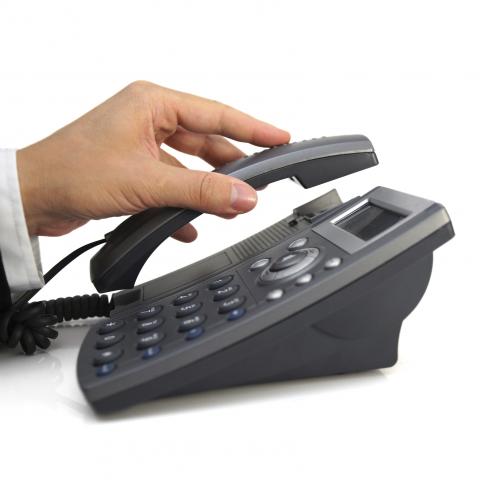
Knowing Polish means being able to use it in many different situations. This includes talking on the phone with someone, whether for business or social purposes. But speaking on the phone in your own language can be frightening enough, let alone doing so in a foreign language!
In this blog post, you’ll learn the most useful Polish phone call phrases for both formal and informal contexts. Knowing these phrases and expressions by heart will allow you to navigate just about any phone conversation with ease.
 Table of Contents
Table of Contents
- Picking up the Phone
- Introducing Yourself on the Phone
- Stating the Reason for Your Call
- Asking to Speak to Someone
- Asking Someone to Wait
- Asking for Clarification
- Leaving a Message
- Time to Say Goodbye
- Sample Phone Conversations
- Final Thoughts
1. Picking up the Phone

The first set of Polish telephone phrases you should learn are those used when picking up the phone. Keep in mind that Polish differentiates between formal and informal language, and this extends to phone conversations.
Let’s start by looking at some things you can say when you’re the one making the call and someone picks up:
- “Hello?” – Słucham?
- “Good day!” – Dzień dobry!
- “Good evening.” – Dobry wieczór.
When starting an informal conversation, you can simply say:
- “Hi!” – Cześć! / Siema!
When you’re on the receiving end, you can say:
- “Hello?” – Tak, słucham? / Halo?
- “[Name] speaking.” – [Name], słucham.
Another way to answer the phone in Polish is with the very informal “Yes?” – Tak?
What are some other ways of greeting people in Polish when not on the phone? See our lesson “Saying Hello No Matter the Time of Day” to find out!
2. Introducing Yourself on the Phone
After someone picks up the phone, you’re expected to introduce yourself. Being able to give a self-introduction is crucial in many contexts, not just on the phone. Here’s a lesson where you can learn more about self-introductions and another on introducing yourself in a business meeting.
Here are two common Polish telephone phrases for introductions:
- “[Name] speaking.” – Z tej strony [name]…
- “Is this [name]?” – Czy rozmawiam z [name – instrumental case]?
Informally, we can be more relaxed and say:
- “It’s me, [given name].” – To ja [given name].
- “[Given name] speaking.” – Mówi [given name].
When you’re the receiver of the call, you can use one of these formal phrases:
- “How can I help you?” – W czym mogę pomóc? / W czym mogę służyć?
Informally, you can stick to:
- “(Sorry,) who am I speaking to?” – (Przepraszam,) z kim rozmawiam?
As you can see, people speak with a higher degree of politeness when the context is formal. In Polish, this is expressed through verb forms as well as word choice.
3. Stating the Reason for Your Call

Now, it’s time to tell the receiver why you’re calling them in the first place. This is an important element of phone etiquette. Here are a few common Polish phone call phrases you can use here:
- “I’m calling about…” – Dzwonię w sprawie…
- “I’d like to speak to…” – Chciałbym / Chciałabym rozmawiać z…
For a male and female speaker, respectively. - “I have a question about…” – Mam pytanie w sprawie…
In more casual contexts, you can allow yourself to be a bit more straightforward and use the second person singular:
- “Do you remember…?” – Pamiętasz…?
- “Do you know by any chance…?” – Wiesz może…? / Znasz może…?
- “Can you recommend…?” – Możesz mi polecić…?
While this article isn’t about Polish verbs, we highly recommend you check out this article on Wikipedia to learn more about different verb forms in Polish. Additionally, you can upgrade your vocabulary with our article on the top 100 Polish verbs.
4. Asking to Speak to Someone
Sometimes, the person who picks up the phone is not who you were hoping to speak to. Luckily, there are a few expressions you can rely on when this happens:
- “Could I speak to [name]?” – Czy mogę rozmawiać z [name – instrumental case]?
- “Could you call [name]?” – Czy można prosić do telefonu [name – instrumental case]?
In casual contexts, try the following phrases:
- “Can you pass [name]?” – Dasz [name – instrumental case]?
- “Is [name] there?” – Jest [name]?
If you want to impress people with your Polish skills by making a joke, you can also quote the Polish cult movie and political satire Seksmisja (Sexmission): Dzień dobry, czy zastałem Jolkę? (“Hello, is Jolka there?”)
5. Asking Someone to Wait

If the person on the other end has asked for information about something or wants to be transferred, you may need to ask them to wait a moment. Here are a few formal Polish phone phrases you can use to do this:
- “Please wait a second.” – Proszę chwileczkę poczekać/zaczekać.
- “I’ll check in a second.” – Zaraz sprawdzę.
- “I’m asking him now.” – Już go/ją proszę.
- “Unfortunately, he’s/she’s not here.” – Niestety go/jej nie ma.
As always, informal circumstances allow you to get straight to the point:
- “Wait a second.” – Zaczekaj chwilę…
- “I’m not sure whether he/she is here. I’ll check.” – Nie wiem czy jest. Sprawdzę.
6. Asking for Clarification
During a Polish phone conversation, you may have difficulty hearing or understanding the other person. Below, you’ll find some expressions you can use to ask for clarification or repetition. Keep in mind that for each phrase, the first version we give is for when the other person is male.
- “Sorry, could you say that again?” – Przepraszam, czy może Pan/Pani powtórzyć?
- “I’m sorry, but I’m having a hard time hearing you.” – Przepraszam, ale słabo Pana/Panią słyszę.
- “Could you spell your name/surname for me, please?” – Czy może Pan/Pani przeliterować swoje imię/nazwisko?
And here are some phrases you might use during an informal conversation:
- “Repeat, please.” – Powtórz, proszę.
- “I almost can’t hear you.” – Prawie Cię nie słyszę.
- “Can you repeat your name, please?” – Możesz powtórzyć jak masz na imię?
Do you need more help in this regard? Then make sure to visit our lesson “Can You Say it Again in Polish?”
7. Leaving a Message

What if the person you’re trying to reach is unavailable? You should have the opportunity to leave a message for them, so here are a few Polish phone call phrases you can use in this situation:
- “Could I leave a message?” – Czy mógłbym zostawić wiadomość?
- “Could you pass a message?” – Czy mogłaby Pani (f) / mógłby Pan (m) coś przekazać?
- “Could you ask them to call me back?” – Czy może Pani (f) / Pan (m) poprosić, żeby do mnie oddzwonili?
And here are some options for informal contexts:
- “Could you pass a message?” – Możesz mu coś przekazać?
- “Can you ask him/her to call me back?” – Możesz go/ją poprosić, żeby do mnie oddzwonił/oddzwoniła?
Are you the one who’s been given the task of passing on a Polish message? Click on the link to find out how to do this.
8. Time to Say Goodbye
When it’s time to finish a Polish phone conversation, these phrases may come in handy:
- “Thank you for your help! Goodbye!” – Dziękuję za pomoc, do widzenia!
- “Have a nice day!” – Miłego dnia!
- “I’ll speak to you soon!” – Do usłyszenia!
As the receiver of the call, you may want to say:
- “Is there anything else I can help with?” – Czy mogę jeszcze jakoś pomóc?
- “I’m wishing you a good day!” – Życzę miłego dnia!
Are you ending a conversation with a friend? Try these expressions:
- “Thanks for your help.” – Dzięki za pomoc.
- “Bye!” – Na razie! / Pa!
Do you know any other ways to say goodbye in Polish? Visit our lesson to add three more phrases to your vocabulary!
9. Sample Phone Conversations

Now that you’ve learned several Polish telephone phrases, it’s time to see how they might be used in real life. Below, you’ll find two dialogue examples: one informal and one formal.
Informal
- – Halo? – “Hello?”
– Cześć Ania! Mówi Ola! – “Hello Ania. It’s Ola.”
– Cześć Ola! – “Hi Ola!”
– Masz jakieś plany na jutro? Może wyskoczyłybyśmy na lunch? – “Do you have any plans for tomorrow? Maybe we could grab lunch together?”
– Świetny pomysł! O której? – “Great idea! What time?”
– Pasuje Ci 12:30? – “Will 12:30 work for you?”
– Trochę za wcześnie. Może być 13? – “It’s a bit too early. Can we do one o’clock?”
– Mi pasuje. Tam gdzie zwykle? – “Works for me. Shall we meet in our usual spot?”
– Nie, spróbujmy coś nowego? Może Cafe Nero? – “No, let’s try something new. How about Cafe Nero?”
– Brzmi super! Zrobię rezerwację! – “Sounds great! I’ll make a booking.”
– Dzięki, do zobaczenia! – “Thanks, see you!”
– Do zobaczenia! – “See you!”
It’s important not to be late to your Polish meeting. Setting up an appointment with a friend and being on time isn’t enough, though. You still need to make a booking for a restaurant, and that needs to be done using more formal language. To give you an idea, here’s what a formal phone call in Polish might sound like:
Formal
- – Cafe Nero, słucham? – “Cafe Nero, hello?”
– Witam, chciałabym zarezerwować stolik dla dwóch osób. – “Hello! I’d like to book a table for two people.”
– Na kiedy? – “For when?”
– Na jutro, na lunch. – “For lunch tomorrow.”
– Na którą godzinę? – “For what time?”
– Na 13. – “For one o’clock.”
– Oczywiście, żaden problem. Na kogo jest rezerwacja? – “Certainly, no problem. Under what name?”
– Na Olę. – “Ola.”
– Świetnie. W takim razie do zobaczenia jutro! – “Great. I’ll see you tomorrow then!”
– Do widzenia. – “Goodbye!”
If you’re wondering how Ania and Ola will order lunch once they’re in the restaurant, click on the link. You can also visit our lessons “At the Table” and “Check, please!” to learn even more handy phrases.
10. Final Thoughts
Being able to have a telephone conversation in Polish is an important skill for you to learn. To do so successfully, you need to know both formal and informal Polish phone phrases and how to use them. We hope that our article has helped you feel more confident in this respect. Let us know in the comments what your first telephone conversation in Polish will be!
Of course, you’ll need to know much more than the phrases outlined in this article to communicate in different day-to-day situations. In order to reach a more advanced level, you’ll need a comprehensive Polish learning course. And this is exactly what PolishPod101 gives you!
With countless recordings by native speakers and engaging lessons on a variety of topics, we’ll ensure you never have a dull moment. You’ll start to notice your comprehension and speaking skills improve before you know it.
Don’t hesitate. Create your free lifetime account today!










